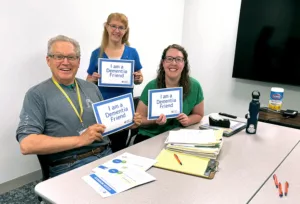
Home » Gonzaga seeks $41 million
Gonzaga seeks $41 million
University would use bond proceeds for various capital projects, to refinance debt
February 26, 1997
Gonzaga University is seeking approval of a $41 million bond issue to pay for a number of planned capital projects on the Jesuit schools campus northeast of downtown Spokane and to refinance some debt.
The university has asked the Washington Higher Education Facilities Authority to issue the bonds. The authority, which obtains savings for private, nonprofit universities and colleges around the state by issuing tax-exempt bonds on their behalf, would loan the bond proceeds to the university. The university would pay off the bonds over a 25-year period. The authority has scheduled a public hearing on the proposed bond sale for 1:30 p.m. next Tuesday at the Sea-Tac Marriott Hotel near Sea-Tac Airport
Gonzaga would use the bulk of the money to pay for construction of a new four-story law school and to buy U.S. Postal Service property on the south side of its campus, says Dale Goodwin, a university spokesman.
It would use most of the remaining money to make unspecified improvements to a number of academic and residence buildings over a five-year period and to refinance some debt remaining from earlier capital projects, he says.
ALSC Architects PS, of Spokane, finished designing the proposed $17.5 million law school earlier this year. Goodwin says the university hopes to begin construction of the 102,000-square-foot structure next spring or summer and to complete the project in the year 2000.
Gonzaga has said that it would like to build the law school either on land it owns just north of the Centennial Trail near the east end of the Don Kardong Bridge or on part of a 14-acre site the Postal Service owns nearby on the other side of the Centennial Trail, at 703 E. Trent. The university has been negotiating with the Postal Service for about a year and a half to acquire that site.
The Postal Service currently operates a 154,000-square-foot, processing-and-distribution facility there. As the Journal reported last month, however, the Postal Service is firming up plans to build a new, much larger distribution facility on a 31-acre site that it would lease in the Spokane International Airport Business Park. If that occurs, the Postal Service is expected to sell its property on Trent.
Gonzaga envisions developing several academic buildings on the Postal Service property eventually, one of them possibly being the law school, and believes the property also would provide an ideal southern entrance to its campus.
Pamela Mead, coordinator for the higher education facilities authority, says the authoritys seven-member board is expected to decide next week whether to approve the bond sale. The authoritys staff has recommended approval of the sale, she says. Because the bonds are tax-exempt, universities and colleges that borrow money through the authority typically can save 1 to 2 percentage points off the interest rate they pay for financing, she says.
The authority is a self-supporting organization, created by the Washington Legislature in 1983. It shares offices in Seattle with the Washington State Housing Finance Commission, which the Legislature founded, also in 1983, to finance the development and rehabilitation of low- and moderate income housing by issuing tax-exempt or taxable revenue bonds on behalf of qualified developers. That commission also is self-supporting. Both organizations depend on fees collected from their financing activities for the administration of their programs. Kim Herman is the executive director for both organizations.
Goodwin says a definitive cost breakdown for the various projects that Gonzaga is planning hasnt been completed yet, partly because the transaction to buy the Postal Service land hasnt been completed.
The building upgrades that are planned would include reconstruction of some classroom space and renovation of some residence-hall space, he says. Unable to be more specific, he says, Its pretty piecemeal. Its a lot of things.
In the past, Gonzaga University has used fund-raising campaigns to pay for many capital projects, but Goodwin says it also has issued revenue bonds on some occasions, including four times in the 1990s.
Most recently, it used revenue bonds to finance construction of the Dussault and Burch apartment complexes, a combined $4.5 million project completed in 1995, and for installation of ZagNet, a $1 million communications network, he says. That network, completed this fall, allows students who live on campus to access the Internet from their dorm rooms or university-owned apartments.
Latest News
Related Articles




